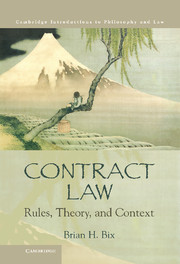Book contents
- Frontmatter
- Contents
- Preface
- 1 Philosophical Problems of Contract Law
- 2 History and Sources
- 3 Formation
- 4 Interpretation
- 5 Performance
- 6 Enforcement and Remedies
- 7 Special Categories of Contract Law
- 8 Modern Contract Law Practices
- 9 How Many Contract Laws?
- Bibliography
- Table of Cases
- Statutes and Restatements
- Index
- References
4 - Interpretation
Published online by Cambridge University Press: 05 November 2012
- Frontmatter
- Contents
- Preface
- 1 Philosophical Problems of Contract Law
- 2 History and Sources
- 3 Formation
- 4 Interpretation
- 5 Performance
- 6 Enforcement and Remedies
- 7 Special Categories of Contract Law
- 8 Modern Contract Law Practices
- 9 How Many Contract Laws?
- Bibliography
- Table of Cases
- Statutes and Restatements
- Index
- References
Summary
The previous chapter dealt with issues of formation. In practice, questions of whether there is a valid contract are probably less common than questions of what the parties’ (valid) contract means. This chapter looks at the rules, standards, and presumptions that govern this often-crucial question.
OBJECTIVE AND SUBJECTIVE
An issue that came up with formation (see Chapter 3, Section A) reappears in interpretation: should interpretation focus on the parties’ subjective (individual, perhaps idiosyncratic) understanding of terms, or should it instead adopt an objective approach, interpreting terms according to some “plain meaning,” dictionary, or “reasonable person” perspective? In the formation context, the question was whether an agreement resulted when two parties appeared to agree on the same terms (e.g., by express assent to a verbal proposal or by signing a written offer) but understood the agreement differently. Assuming that there is a valid agreement, the interpretation question is how the differently understood terms are to be applied. As discussed in the prior chapter, American contract law responds to formation issues in an objective way. With interpretation, the inclination remains largely objective but with some notable modifications.
- Type
- Chapter
- Information
- Contract LawRules, Theory, and Context, pp. 54 - 70Publisher: Cambridge University PressPrint publication year: 2012

